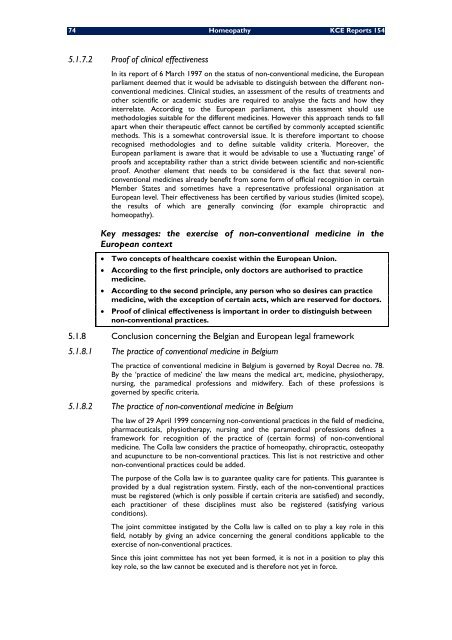Etat des lieux de l'homéopathie en Belgique - KCE
Etat des lieux de l'homéopathie en Belgique - KCE
Etat des lieux de l'homéopathie en Belgique - KCE
You also want an ePaper? Increase the reach of your titles
YUMPU automatically turns print PDFs into web optimized ePapers that Google loves.
74 Homeopathy <strong>KCE</strong> Reports 154<br />
5.1.7.2 Proof of clinical effectiv<strong>en</strong>ess<br />
In its report of 6 March 1997 on the status of non-conv<strong>en</strong>tional medicine, the European<br />
parliam<strong>en</strong>t <strong>de</strong>emed that it would be advisable to distinguish betwe<strong>en</strong> the differ<strong>en</strong>t nonconv<strong>en</strong>tional<br />
medicines. Clinical studies, an assessm<strong>en</strong>t of the results of treatm<strong>en</strong>ts and<br />
other sci<strong>en</strong>tific or aca<strong>de</strong>mic studies are required to analyse the facts and how they<br />
interrelate. According to the European parliam<strong>en</strong>t, this assessm<strong>en</strong>t should use<br />
methodologies suitable for the differ<strong>en</strong>t medicines. However this approach t<strong>en</strong>ds to fall<br />
apart wh<strong>en</strong> their therapeutic effect cannot be certified by commonly accepted sci<strong>en</strong>tific<br />
methods. This is a somewhat controversial issue. It is therefore important to choose<br />
recognised methodologies and to <strong>de</strong>fine suitable validity criteria. Moreover, the<br />
European parliam<strong>en</strong>t is aware that it would be advisable to use a ‘fluctuating range’ of<br />
proofs and acceptability rather than a strict divi<strong>de</strong> betwe<strong>en</strong> sci<strong>en</strong>tific and non-sci<strong>en</strong>tific<br />
proof. Another elem<strong>en</strong>t that needs to be consi<strong>de</strong>red is the fact that several nonconv<strong>en</strong>tional<br />
medicines already b<strong>en</strong>efit from some form of official recognition in certain<br />
Member States and sometimes have a repres<strong>en</strong>tative professional organisation at<br />
European level. Their effectiv<strong>en</strong>ess has be<strong>en</strong> certified by various studies (limited scope),<br />
the results of which are g<strong>en</strong>erally convincing (for example chiropractic and<br />
homeopathy).<br />
Key messages: the exercise of non-conv<strong>en</strong>tional medicine in the<br />
European context<br />
• Two concepts of healthcare coexist within the European Union.<br />
• According to the first principle, only doctors are authorised to practice<br />
medicine.<br />
• According to the second principle, any person who so <strong><strong>de</strong>s</strong>ires can practice<br />
medicine, with the exception of certain acts, which are reserved for doctors.<br />
• Proof of clinical effectiv<strong>en</strong>ess is important in or<strong>de</strong>r to distinguish betwe<strong>en</strong><br />
non-conv<strong>en</strong>tional practices.<br />
5.1.8 Conclusion concerning the Belgian and European legal framework<br />
5.1.8.1 The practice of conv<strong>en</strong>tional medicine in Belgium<br />
The practice of conv<strong>en</strong>tional medicine in Belgium is governed by Royal Decree no. 78.<br />
By the ‘practice of medicine’ the law means the medical art, medicine, physiotherapy,<br />
nursing, the paramedical professions and midwifery. Each of these professions is<br />
governed by specific criteria.<br />
5.1.8.2 The practice of non-conv<strong>en</strong>tional medicine in Belgium<br />
The law of 29 April 1999 concerning non-conv<strong>en</strong>tional practices in the field of medicine,<br />
pharmaceuticals, physiotherapy, nursing and the paramedical professions <strong>de</strong>fines a<br />
framework for recognition of the practice of (certain forms) of non-conv<strong>en</strong>tional<br />
medicine. The Colla law consi<strong>de</strong>rs the practice of homeopathy, chiropractic, osteopathy<br />
and acupuncture to be non-conv<strong>en</strong>tional practices. This list is not restrictive and other<br />
non-conv<strong>en</strong>tional practices could be ad<strong>de</strong>d.<br />
The purpose of the Colla law is to guarantee quality care for pati<strong>en</strong>ts. This guarantee is<br />
provi<strong>de</strong>d by a dual registration system. Firstly, each of the non-conv<strong>en</strong>tional practices<br />
must be registered (which is only possible if certain criteria are satisfied) and secondly,<br />
each practitioner of these disciplines must also be registered (satisfying various<br />
conditions).<br />
The joint committee instigated by the Colla law is called on to play a key role in this<br />
field, notably by giving an advice concerning the g<strong>en</strong>eral conditions applicable to the<br />
exercise of non-conv<strong>en</strong>tional practices.<br />
Since this joint committee has not yet be<strong>en</strong> formed, it is not in a position to play this<br />
key role, so the law cannot be executed and is therefore not yet in force.

















